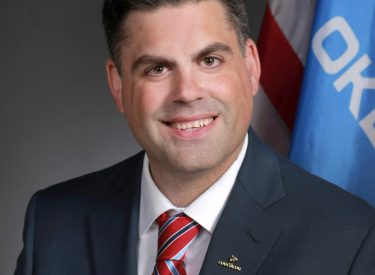Play-Based Therapy Subject of Study
Mike Seals - September 24, 2020 9:58 pm

Rep. Jacob Rosecrants
OKLAHOMA CITY — State Rep. Jacob Rosecrants, D-Norman, hosted an interim study Wednesday to explore ways to increase educational outcomes and the health and well being of Oklahoma students.
The study, “How Play-based Learning Leads to Better Mental Health and Academic Outcomes,” featured a variety of presenters and was an extension work the Norman legislator did in 2019 when he formed the “Play-based Working Group,” which consisted of 30 early childhood education stakeholders, including early childhood educators, early childhood professors, parents, and medical experts, from all over the state.
“Anyone who has talked to me over the past year has most likely heard about ‘play-based learning,’” Rosecrants said. “We know children don’t learn the same. This different approach to education has shown a lot of success not just in education outcomes but also in overall engagement and mental health of our students.”
University of Oklahoma Early Childhood Institute Director Becca Waggoner attended the study to speak to the data around play-based learning.
“Play-based learning in schools creates happy, self-adjusted and academically competent students,” Waggoner said. “It allows teachers the opportunity to teach in a way that coincides with how children already learn, and is backed by hundreds of years of research that relates to developmentally appropriate best practices. Enabling children to learn through play engages children in deep, critical thinking with their peers and the world around them.”
Hailey Couch, a Norman 2nd-grade educator, uses play-based learning in her classroom.
“It is vital for early learners to be allowed play-based learning opportunities to develop and improve their physical, cognitive, social, and emotional developmental skills,” Couch said. “When partaking in play-based learning, children participate in collaboration, conflict resolution, logical thinking, stress management, decision making, communication, emotional regulation, resulting in bettering mental health and academic skills.”
The working group, led by Rosecrants, came up with the language of what is now called “The Oklahoma Play-based Learning Initiative” or House Bill 2794 – legislation Rosecrants plans on carrying again in the 2021 session after it unanimously passed the House but failed to receive a hearing in the Senate due to COVID.
“We are starting to see a coalition come together for our students – as a former educator it’s a great thing to see,” Rosecrants said. “We ran into some issues the last session due to COVID, but I believe we are going to get legislation to the governor’s desk that prioritizes play-based education.”
Norman parent Emily Spivey, whose children have been in classrooms where play-based learning is prioritized, sees how the education technique has impacted her children.
“As a parent, I can see the emotional and academic benefits of play,” Spivey said. “I have watched my children create, explore, problem-solve, and communicate through play and I hope that their learning can continue to be meaningful through play. Play-based learning gives children the opportunity to learn in meaningful ways through hands-on interactions, communication with peers, and active discovery! It’s the way of the child.”



